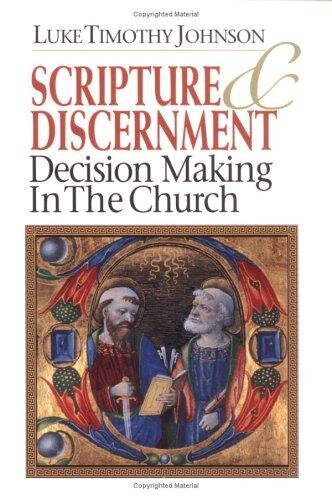Luke Timothy Johnson, Scripture and Discernment: Decision Making in the Church. Abingdon Press, 1996.
Referenced in:
- Conflict Education, Biblical Visions of Peacemaking/Reconciliation
- Understanding the Dynamics of Church Conflict
LifeandLeadership.com Summary
This a frequently refrenced text on the theology of conflict and the role of community discernment through prayer and biblical reflection. See the publisher’s summary below.
From the Publisher
Luke Timothy Johnson begins his study of the practical issue of how decisions are made in the church by admitting to a bias: that there ought to be a connection between what the church claims to be, and how it does things. Because the church claims to be a community of faith, it does not reach decisions simply on the basis of good management policy, or the analysis of market trends, or efficiency, or even ideological consistency, but in response to God’s activity in the world that presses upon us and urges us to decision.
Faced with how to respond to God’s leading, the church decides what to do on the basis of two realities: Scripture and discernment. Because it calls the church into being Scripture is the fundamental authority in the church’s life. Yet it is not enough for a congregation simply to turn to the Bible when a decision must be reached, for Scripture does not directly address all issues which face the church today, and those it does often reflect greatly differing historical and social contexts than our own.
Thus, added to the authority of Scripture in the church’s decision making is a process of discernment, in which the members of the community—under the guidance of the Holy Spirit—recall how God has worked in their lives as individuals and as a community and discern together God’s direction for the future. Johnson argues that this very pattern of decision making can be found in Scripture itself, notably in one of the central events of the book of Acts. Beginning with the conversion of Cornelius and culminating in the Apostolic Council of Acts 15, we see how a string of smaller narratives combine to tell the story of God’s movement within their midst, and how this narrative became the basis for the reinterpretation of Scripture and the inclusion of Gentiles into the fellowship of the church.
Looking at a number of thorny issues facing the contemporary church, Johnson demonstrates how the interaction of Scripture and discernment can and must become the basis for how we respond to the decisions with which the church wrestles today.
About the Author
Luke T. Johnson, Robert W. Woodruff Professor of New Testament and Christian Origins, Candler School of Theology, Emory University, Atlanta, Georgia (The Roman Catholic Church).
***For additional information on this resource, including reviews, click the bookstore links. Check the reference at page top or the links below for resource guides on related topics.***
Related Areas
See Other Resources on Church Conflict:
See Resources on Over 100 Areas of Ministry Leadership:


